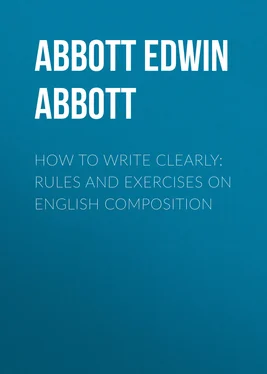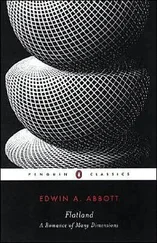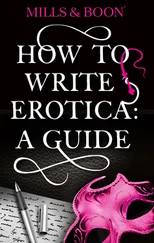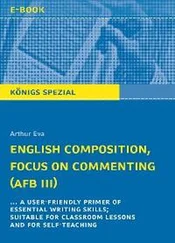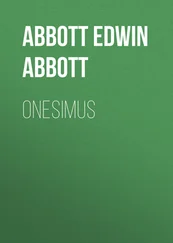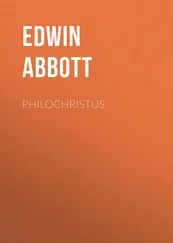Edwin Abbott - How to Write Clearly - Rules and Exercises on English Composition
Здесь есть возможность читать онлайн «Edwin Abbott - How to Write Clearly - Rules and Exercises on English Composition» — ознакомительный отрывок электронной книги совершенно бесплатно, а после прочтения отрывка купить полную версию. В некоторых случаях можно слушать аудио, скачать через торрент в формате fb2 и присутствует краткое содержание. Жанр: foreign_antique, foreign_language, foreign_edu, на английском языке. Описание произведения, (предисловие) а так же отзывы посетителей доступны на портале библиотеки ЛибКат.
- Название:How to Write Clearly: Rules and Exercises on English Composition
- Автор:
- Жанр:
- Год:неизвестен
- ISBN:нет данных
- Рейтинг книги:4 / 5. Голосов: 1
-
Избранное:Добавить в избранное
- Отзывы:
-
Ваша оценка:
- 80
- 1
- 2
- 3
- 4
- 5
How to Write Clearly: Rules and Exercises on English Composition: краткое содержание, описание и аннотация
Предлагаем к чтению аннотацию, описание, краткое содержание или предисловие (зависит от того, что написал сам автор книги «How to Write Clearly: Rules and Exercises on English Composition»). Если вы не нашли необходимую информацию о книге — напишите в комментариях, мы постараемся отыскать её.
How to Write Clearly: Rules and Exercises on English Composition — читать онлайн ознакомительный отрывок
Ниже представлен текст книги, разбитый по страницам. Система сохранения места последней прочитанной страницы, позволяет с удобством читать онлайн бесплатно книгу «How to Write Clearly: Rules and Exercises on English Composition», без необходимости каждый раз заново искать на чём Вы остановились. Поставьте закладку, и сможете в любой момент перейти на страницу, на которой закончили чтение.
Интервал:
Закладка:
*11. Use particular for general terms.*—This is a most important rule. Instead of "I have neither the necessaries of life nor the means of procuring them," write (if you can with truth ), "I have not a crust of bread, nor a penny to buy one."
CAUTION.—There is a danger in this use. The meaning is vividly expressed but sometimes may be exaggerated or imperfect. Crust of bread may be an exaggeration; on the other hand, if the speaker is destitute not only of bread, but also of shelter and clothing, then crust of bread is an imperfect expression of the meaning.
In philosophy and science, where the language ought very often to be inclusive and brief, general and not particular terms must be used.
*11 a. Avoid Verbal Nouns where Verbs can be used instead.* The disadvantage of the use of Verbal Nouns is this, that, unless they are immediately preceded by prepositions, they are sometimes liable to be confounded with participles. The following is an instance of an excessive use of Verbal Nouns:
"The pretended confession of the secretary was only collusion to lay the jealousies of the king's favouring popery, which still hung upon him, notwithstanding his writing on the Revelation, and affecting to enter on all occasions into controversy, asserting in particular that the Pope was Antichrist."
Write "notwithstanding that he wrote and affected &c."
*12. Use a particular Person instead of a class.*
"What is the splendour of the greatest monarch compared with the beauty of a flower ?" "What is the splendour of Solomon compared with the beauty of a daisy?"
Under this head may come the forcible use of Noun for Adjective: "This fortress is weakness itself."
An excess of this use is lengthy and pedantically bombastic, e.g. , the following paraphrase for "in every British colony:"—"under Indian palm-groves, amid Australian gum-trees, in the shadow of African mimosas, and beneath Canadian pines."
*13. Use Metaphor instead of literal statement.*
"The ship ploughs the sea" is clearer than "the ship cleaves the sea," and shorter than "the ship cleaves the sea as a plough cleaves the land ."
Of course there are some subjects for which Metaphor should not be used. See (14 a ) and (14 b ).
*14. Do not confuse Metaphor.*
"In a moment the thunderbolt was upon them, deluging their country with invaders."
The following is attributed to Sir Boyle Roche: "Mr. Speaker, I smell a rat, I see him brewing in the air; but, mark me, I shall yet nip him in the bud."
Some words, once metaphorical, have ceased to be so regarded. Hence many good writers say " under these circumstances " instead of " in these circumstances."
An excessive regard for disused metaphor savours of pedantry: disregard is inelegant. Write, not, " unparalleled complications," but " unprecedented complications;" and " he threw light on obscurities," instead of " he unravelled obscurities."
*14 a. Do not introduce literal statement immediately after Metaphor.*
"He was the father of Chemistry, and brother to the Earl of Cork."
"He was a very thunderbolt of war,
And was lieutenant to the Earl of Mar."
*14 b. Do not use poetic metaphor to illustrate a prosaic subject.* Thus, we may say "a poet soars ," or even, though rarely, "a nation soars to greatness," but you could not say "Consols soared to 94-1/2." Even commonplace subjects may be illustrated by metaphor: for it is a metaphor, and quite unobjectionable, to say "Consols mounted , or jumped to 94-1/2." But commonplace subjects must be illustrated by metaphor that is commonplace.
ORDER OF WORDS IN A SENTENCE
*15. Emphatic words must stand in emphatic positions; i.e. for the most part, at the beginning or at the end of the sentence.* This rule occasionally supersedes the common rules about position. Thus, the place for an adverb, as a rule, should be between the subject and verb: "He quickly left the room;" but if quickly is to be emphatic, it must come at the beginning or end, as in "I told him to leave the room slowly, but he left quickly ."
Adjectives, in clauses beginning with "if" and "though," often come at the beginning for emphasis: " Insolent though he was, he was silenced at last."
*15 a. Unemphatic words must, as a rule, be kept from the end of the sentence.* It is a common fault to break this rule by placing a short and unemphatic predicate at the end of a long sentence.
"To know some Latin, even if it be nothing but a few Latin roots, is useful ." Write, "It is useful, &c."
So "the evidence proves how kind to his inferiors he is ."
Often, where an adjective or auxiliary verb comes at the end, the addition of an emphatic adverb justifies the position, e.g. above, "is very useful," "he has invariably been."
A short "chippy" ending, even though emphatic, is to be avoided. It is abrupt and unrhythmical, e.g. "The soldier, transfixed with the spear, writhed ." We want a longer ending, "fell writhing to the ground," or, "writhed in the agonies of death." A "chippy" ending is common in bad construing from Virgil.
*Exceptions.*—Prepositions and pronouns attached to emphatic words need not be moved from the end; e.g. "He does no harm that I hear of ." "Bear witness how I loved him ."
*N.B. In all styles, especially in letter-writing, a final emphasis must not be so frequent as to become obtrusive and monotonous.*
*15 b. An interrogation sometimes gives emphasis.* "No one can doubt that the prisoner, had he been really guilty, would have shown some signs of remorse," is not so emphatic as "Who can doubt, Is it possible to doubt, &c.?"
Contrast "No one ever names Wentworth without thinking of &c." with "But Wentworth,—who ever names him without thinking of those harsh dark features, ennobled by their expression into more than the majesty of an antique Jupiter?"
*16. The subject, if unusually emphatic, should often be removed from the beginning of the sentence.* The beginning of the sentence is an emphatic position, though mostly not so emphatic as the end. Therefore the principal subject of a sentence, being emphatic, and being wanted early in the sentence to tell us what the sentence is about, comes as a rule, at or near the beginning: " Thomas built this house."
Hence, since the beginning is the usual place for the subject, if we want to emphasize "Thomas" unusually , we must remove "Thomas" from the beginning: "This house was built by Thomas ," or "It was Thomas that built this house."
Thus, the emphasis on "conqueror" is not quite so strong in " A mere conqueror ought not to obtain from us the reverence that is due to the great benefactors of mankind," as in "We ought not to bestow the reverence that is due to the great benefactors of mankind, upon a mere conqueror ." Considerable, but less emphasis and greater smoothness (19) will be obtained by writing the sentence thus: "We ought not to bestow upon a mere conqueror &c."
Where the same subject stands first in several consecutive sentences, it rises in emphasis, and need not be removed from the beginning, even though unusual emphasis be required:
"The captain was the life and soul of the expedition. He first pointed out the possibility of advancing; he warned them of the approaching scarcity of provisions; he showed how they might replenish their exhausted stock &c."
Читать дальшеИнтервал:
Закладка:
Похожие книги на «How to Write Clearly: Rules and Exercises on English Composition»
Представляем Вашему вниманию похожие книги на «How to Write Clearly: Rules and Exercises on English Composition» списком для выбора. Мы отобрали схожую по названию и смыслу литературу в надежде предоставить читателям больше вариантов отыскать новые, интересные, ещё непрочитанные произведения.
Обсуждение, отзывы о книге «How to Write Clearly: Rules and Exercises on English Composition» и просто собственные мнения читателей. Оставьте ваши комментарии, напишите, что Вы думаете о произведении, его смысле или главных героях. Укажите что конкретно понравилось, а что нет, и почему Вы так считаете.
